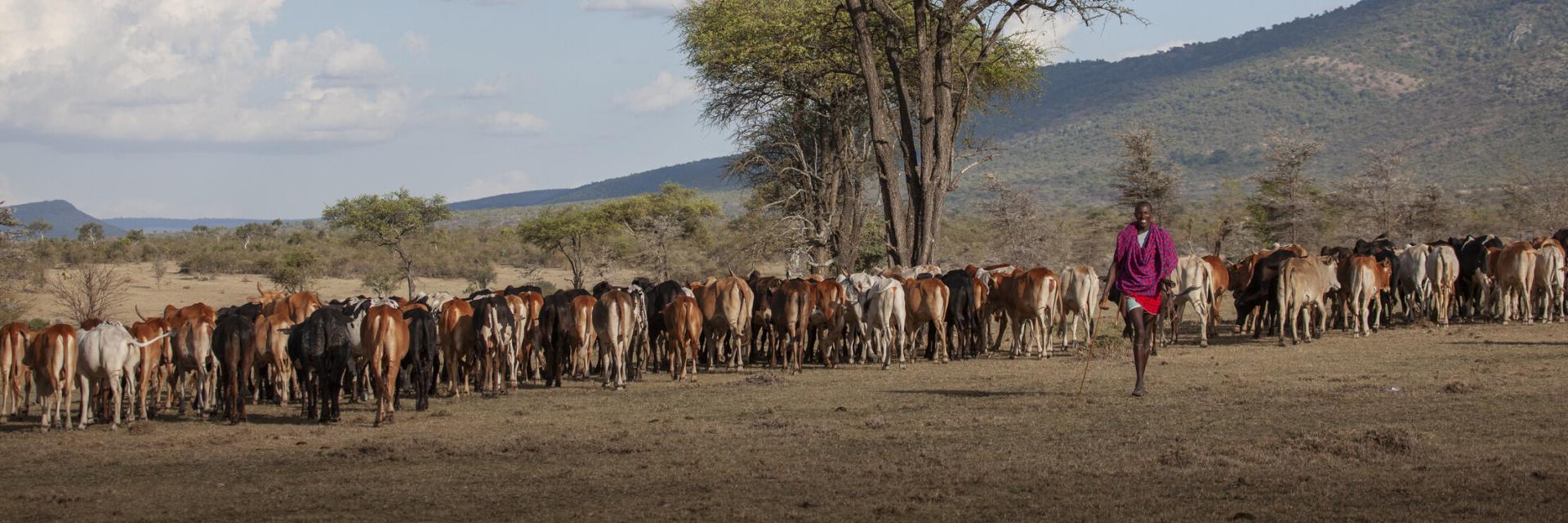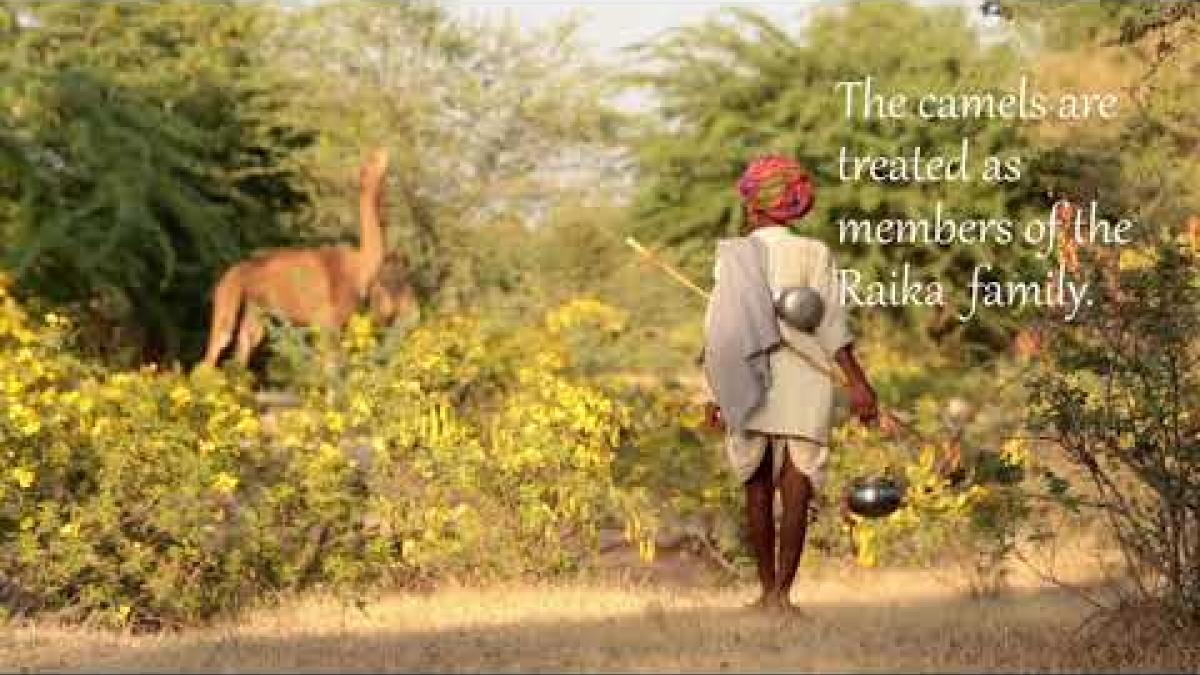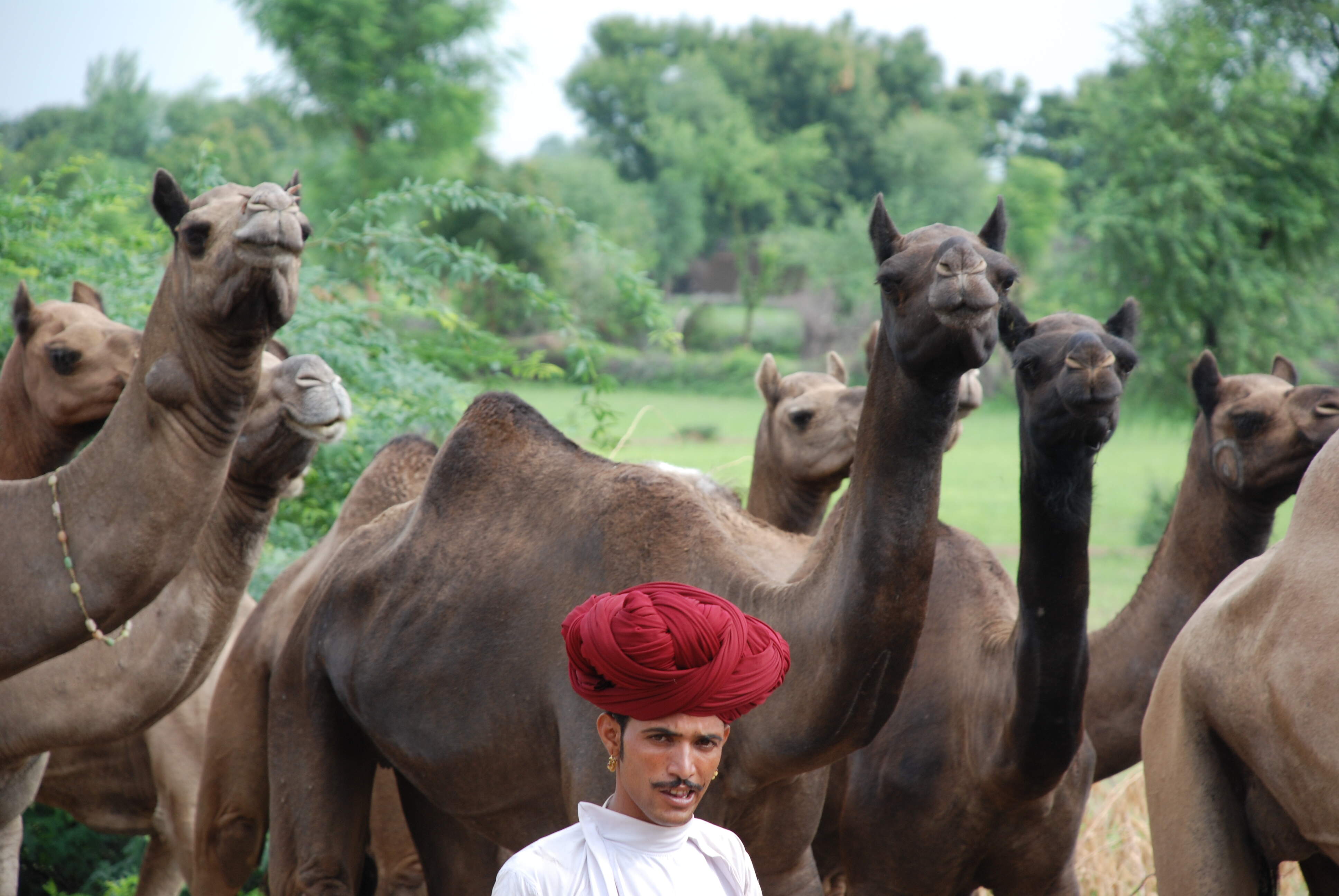
The Maasai, like other pastoralists all over Africa, have lived for centuries earning their livelihood from herding livestock, cows, goats, and sheep, roaming over hundreds of kilometers in search of water and grazing land for their cattle.
Credit: Buena Vista Images / Getty ImagesPastoralism
Support pastoralists as vital practitioners of a cultural and land management way of life that is resilient and has numerous social, environmental, and climate benefits.
Pastoralism is both a way of life and a land use system that engages animal husbandry over open grasslands, including drylands, often communally managed. Animals include goats, sheep, cattle, yak, reindeer, and llamas. Herds are managed by cultural practices honed over centuries. Pastoralism is practiced on one-quarter of the earth's habitable land, including the Steppe cultures of Mongolia and the Massai in Tanzania. It is one of the most regenerative uses of rangelands. Where traditional practices and Indigenous knowledge are intact, biological diversity is enhanced, and ecosystem health is maintained. Pastoral systems are highly adaptive and sensitive to changes in environmental conditions, offering time-tested examples of how to manage uncertainty. However, contemporary conditions, including the privatization of land for development, more frequent droughts, and growing competition for resources, make it increasingly difficult for pastoralists to thrive. Even in the face of these challenges, pastoralists have the potential to support human and environmental resilience by diversifying food production, securing livelihoods in difficult environments, and protecting biodiversity.
Action Items
Individuals
Learn about pastoralism and its benefits. Pastoralist culture developed during the Neolithic period in places with semi-arid ecologies, including the Middle East, Eurasia, and East Africa (see Grasslands Nexus). It is centered on herds of grazing animals. Today, roughly 200-500 million people practice a pastoral lifestyle on every habitable continent, and 75 percent of all nations have some pastoral cultures within their borders. The herded animals provide pastoral groups with essential meat, milk, and other products year-round. Recognizing their importance, the UN named 2026 the International Year of Rangelands and Pastoralists. Key points about pastoralism:
- Nomadism. Nomadic pastoralism is characterized by the movement of grazing of animals as a herd in an irregular pattern from year to year with no pre-set pastures, often over long distances and accompanied by the group or tribe associated with their animals. Herds are moved based on seasonal conditions and available grass for grazing and are commonly practiced in areas with little arable land. Examples include the Bedouin of North Africa, the Mongols of the Asian Steppe, and the Saami of northern Finland.
- Transhumance. Transhumance is a seasonally-based, 'semi-nomadic’ pastoral practice of moving herds of animals between the same winter and summer pastures in a particular area, usually from lower elevations to higher ones as the season progresses and grass becomes available. Generally, the herds are accompanied only by their shepherds as they travel to the seasonal pastures, as traditionally practiced in Nepal and the Sahel region of Africa.
- Sedentary. Known also as pastoral farming, this type of pastoralism has developed in relation to the modern conditions of private land ownership, political borders, and crop farming. It is exemplified by the modern ranch. It is often linked to regenerative agricultural practices, including livestock herding and short-duration grazing (see Regenerative Agriculture Nexus, Animal Integration Nexus, and Silvopasture Nexus).
- The importance of range and dryland ecosystems. Grassland ecosystems store roughly one-third of all terrestrial carbon. Arid and semi-arid ecosystems are dynamic, full of life, and important to biogeochemical cycles. They cover approximately 40 percent of the world’s land area and support two billion people, 90 percent of whom live in developing countries. By understanding and working with the dynamics of these environments, pastoral systems have evolved to provide resilient economies for the people who live in them and, if practiced wisely, maintain ecological health.
- A world with a changing climate. A defining characteristic of pastoral practices is flexibility. In a world where dramatic weather events and unpredictable climatic fluctuations are becoming more frequent, the pastoral understanding of harmonizing with a particular ecology through flexibility and movement can be seen as a strong marker of resilience. While industrial-scale animal operations contribute to the degradation of ecologies, pastoral practices can have a sustainable and regenerative effect on the overall impact of the food system.
- Indigenous communities and rights. Organizations such as the Indigenous Peoples’ Global Platform are working to build a common voice among Indigenous peoples who are engaged in securing land use rights and self-determination as pastoralists. Here is a short video on the rights of pastoralists. The Navajo in the American Southwest have practiced pastoralism for centuries with Churro sheep, which is suited to the cultural and economic needs of the people. Years of government and private encroachment on traditional grazing land have helped create economic and cultural instability. However, as with new movements to revitalize Navajo grazing rights, restoration of pastoral practice can be fundamental to the overall health and empowerment of the community.
Understand the threats pastoralists face. Pastoralism is an agroecological practice and a cultural tradition of community and society building that exists outside of the mechanisms of global markets and state institutions (see Agroecology Nexus). Ensuring free movement and access to rangelands is crucial to protecting and maintaining pastoral culture. However, many factors threaten the sustainability of pastoralist cultures. Desertification, for example, is a severe form of land degradation that is increasing in many areas where pastoralism is practiced (see Desertification Nexus). The effects of climate change and increasing conflicts over political boundaries and land use rights are hindering many pastoralists from effectively utilizing viable grazing grounds. Threats include:
- Drought. One of the major impacts of climate change is the increasing frequency and severity of droughts. It is estimated that the occurrence of drought in Ethiopia has increased from once every eight years to once every two years. This has cascading effects, from reducing access to drinking water for livestock to desertification and loss of grass for food. Introducing pastoralists to new water and habitat restoration techniques can support the resiliency of the pastoral life-way.
- Land Fragmentation. With increased privatization of land and the expansion of farming practices due to increased global demand, pastoralists are losing the ability to graze their animals freely. Research from China has shown how land fragmentation directly leads to the degradation of rangeland ecologies. Urbanization is also rapidly encroaching on grazing lands in many countries. The Maasai are one example of traditional pastoralists trying to adapt to urbanization around Nairobi, Kenya.
- Economics. As an agroecological activity, pastoralism resists integration into the global economic system, often putting it at risk from market forces. Any solution to the challenge of sustaining pastoral economies in the modern global economy will require a holistic evaluation of how a pastoral economy can operate today. The World Initiative for Sustainable Pastoralism from the IUCN has conducted this comprehensive review to further this type of holistic thinking.
- Conservation. In the past, the creation of national parks and monuments, wilderness areas, and other types of ‘protected’ lands for conservation purposes have excluded or disempowered pastoral and Indigenous peoples. Here is an example from Tanzania involving Maasai pastoralists. Fortunately, attitudes among conservationists have evolved in recent years, especially as the value of traditional and Indigenous ecological knowledge and stewardship has become recognized.
Learn what you can do to support pastoralists. There are options for individuals who want to support pastoral cultures as well as different types of pastoral activities.
- Support a nonprofit that is working on behalf of pastoralism. You can donate, volunteer, or sign up for newsletters. The League for Pastoral Peoples and the Centre for Pastoralism are two examples. See Key Players below for more organizations.
- Participate in pastoral-focused ecotourism. Some pastoral peoples, such as the Maasai in Kenya, are using ecotourism as a way to generate economic support. However, ecotourism is controversial and can often create more challenges than benefits for pastoralists and Indigenous communities. Here and here are articles on how to identify sustainable ecotourism opportunities.
- Buy food products from regenerative agricultural enterprises that use herding or other pastoral practices. Many regenerative farms and ranches often have a variety of food and other products for sale. The Brown Ranch in South Dakota and Polyface Farms in Virginia are examples. See Regenerative Agriculture Nexus for more ideas.
- Become a shepherd. There is a growing movement of young people embracing and pursuing shepherding as a way of life. With potential opportunities in land stewardship and prescribed grazing, The Grazing School of the West offers vocational training for aspiring graziers. A connection to the beauty of shepherding and the responsibility of keeping it alive has led to a resurgence from Spain to California.
Groups
Pastoralist communities
Besieged with global challenges, pastoralists are finding practical and policy solutions that increase productivity while creating respect and support for their way of life. Join the FAO’s Pastoralist Knowledge Hub to share ideas and experiences.
- Organize to defend land rights. PINGO, the Pastoralists Non-Governmental Organization's Forum, is a leading model for the organization of pastoral peoples to secure their rights. PINGO is a coalition of fifty-three Indigenous peoples organizations working in Tanzania for the rights of indigenous pastoralists. The IUCN has also published a thorough case study containing numerous examples from seventeen different countries that are working to secure their rights.
- Consider ecotourism. Here is a toolkit from UNESCO for sustainable tourism.
- New technology. Open-source software, digital technology, and social media networks create new opportunities for pastoralists to manage their herds, find fresh pastures, and avoid conflicts.
NGOs
Help keep pastoral communities intact. There are many ways of supporting pastoral communities, from helping transition them to working on infrastructure projects to help adjust to the demands already posed by climate change.
- The Centre for Pastoralism in northern India is working to quantify pastoral livelihoods to better integrate them into economic and developmental plans in the region.
- Communities facing a change in their way of life often need assistance in helping to navigate that change to remain healthy and adapt. The Pastoral Peace Reconciliation Initiative works in Africa to resolve conflict and heal trauma among pastoral peoples.
- The non-profit Pastoralism, Uncertainty, Resilience focuses on learning directly from pastoralists themselves to craft solutions that work. They offer a free and comprehensive online self-study course on the ecological, economic, and cultural aspects of pastoralism.
Promote an understanding of the economic and ecological benefits of pastoralism. Traditional pastoral cultures need support in advocating their needs to governments and policymakers. Groups such as PINGO, an advocacy coalition in Tanzania working for the rights of pastoral people, serve as a model for NGO intervention in pastoralist preservation and sustainability.
- IIED is researching the benefits of pastoralism in East Africa. They also work in advocating for and training pastoralists to meet contemporary challenges, including the creation of new local-level climate adaptation funds.
- The International Land Coalition, through its Global Rangelands Initiative, is working to provide technical support to pastoralists, governments, and anyone working in the field to help make rangelands more secure for pastoralist peoples.
Governance
Initiate policies that include and support pastoralists. A significant challenge for governments and policymakers is recognizing the need for pastoralists to have access to land, particularly along traditional migration routes. This potential for neglect puts pastoralists at a clear disadvantage in the global marketplace and local environments. Changing the perception of pastoralist practices as a viable solution to dryland management is an essential step in encouraging supportive policies. Including pastoralists in government policy will also help manage conflict between pastoralists and sedentary agriculturists.
- The government of Uganda recognizes the rights of Indigenous pastoralist communities and is working to articulate those rights in its laws and policies.
- Multiple governments are working across borders in the Sahel region of Africa to craft policies that will support and include pastoralists.
- In a time of economic and environmental pressure, governments must be reminded and educated on the importance of pastoralism for food security in arid regions. The United Nations is working with the government of Sudan to persuade them that pastoralist culture provides a key component to future sustainability. In Somalia, the Directorate of Environment and Climate Change has instituted a program to help hundreds of thousands of pastoralists adapt to climate-related droughts.
- In France, shepherds hold a deep observational knowledge of the ecosystems they inhabit and graze their flocks. By respecting and understanding how these traditional grazing techniques are integrated into holistic ecosystem management, as in the French Alps, governments can maintain conservation areas while keeping traditional knowledge and practice alive.
Commit to the tenets of Sustainable Pastoralism. With increasing degradation of rangelands, Sustainable Pastoralism, as defined by the United Nations, proposes to be an effective way to conserve and responsibly use these ecosystems. There are six key aspects that have been identified as crucial to supporting a Sustainable Pastoralist culture in the modern world
- Providing basic services to pastoralists, including healthcare, renewable energy, and schooling, that fit with their mobile production systems.
- Legal protection of collective land and resource rights.
- Equitable value chains and market access that provide economic opportunities for pastoralists.
- Empowered pastoralist institutions and systems through increased presence in decision-making, respect for cultural knowledge, and enabling information sharing and networking.
- Supportive policies and fair trade.
- Consumers and producers should be aware of the need to respect the value of rangeland biodiversity and cultural perspectives on land management.
Key Players
Listen
Watch
Grassland Stewards of East Africa (11 mins.)
Pastoralism, Biodiversity, and Health (5 mins.)
Pastoralists Integrated Concerns (3 mins.)
Read
Counting the Costs by Roy Behnke, Carol Kervin
Hoofprints on the Land by Ilse Köhler-Rollefson
The Art and Science of Shepherding: Tapping the Wisdom of French Herders / edited by Michel Meuret and Fred Provenza
Pastoralism, Uncertainty and Development edited by Ian Scoones
Adapting Nomadic Pastoralism to Climate Change by Navchaa Tugjamba, et. al.
Listen
Nomadic Pastoralism among Mongol Herders - an interview with Maggie Freeman (45 mins.)
Nomads, Past and Present - podcast
Adam and his Goats: Thoughts on Modern Day Pastoralism - The Ground Shots Podcast (70 mins.)
Complex Landscape Mosaics and the Paradox of Pastoral Tenure - In Common Podcast (80 mins.)
Pastoralism: Living and Working on the Move - BIC Talks (47 mins.)
Andean Pastoralist Livelihood Initiative - Weaving Voices Podcast (34 mins.)
Share this page


